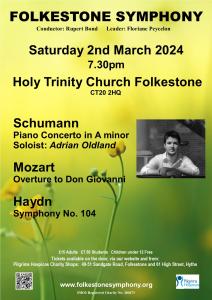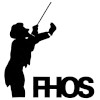Spring Concert - Saturday, 2nd March 2024

Mozart - Overture to Don Giovanni
Schumann - Piano Concerto in A minor, Op. 54
- Soloist: Adrian Oldland
Haydn - Symphony No. 104
Holy Trinity Church,
Sandgate Road,
Folkestone,
CT20 2HQ

Review
In his opening remarks at the Folkestone Symphony concert on Saturday 2nd March, conductor Rupert Bond made reference to the terrible weather that evening. However, it seems that nothing comes between this orchestra’s huge loyal following and its music making, as Holy Trinity Church was as full as could be for this wonderful exploration of late classical and early Romantic music. Much of the credit must go to Mr Bond himself, whose clarity and balanced choice of speeds made these performances very special. Unusually for an orchestra used to playing grand nineteenth century works, all three pieces would have originally been played by a somewhat smaller band, but what a pleasure it was to hear the expansive sound of a large and very talented set of string players led expertly and enthusiastically by Flo Peycelon.
Of all Mozart’s overtures, the one to Don Giovanni is the most dramatic and, although the overture does not portray the fall to hell of the eponymous character, this evening’s vibrant performance certainly foreshadowed the infernal end from the terrifying brass chords of the opening to the swift, sinuous, scales of the strings. There was never a loss of tension as the sharp battle between violins and woodwind set the audience up for a fine evening.
The Schumann piano concerto which followed was by contrast full of melody, exquisitely phrased by local soloist Adrian Oldland. The piece is known for its abundance of virtuoso passages and it was clear from the outset that we were in the hands of a master musician and one whose affection for the composer shone through this poignant and joyous interpretation. Schumann was unusual in that neither orchestra nor piano dominate in the piece and the effect here was a splendid partnership between players and soloist. Particularly impressive was the delicate playing of all four woodwind sections and the careful control of the cross-rhythm complexities in the final movement.
After the interval, we were able to look back over the considerable contributions of Haydn to the development of the symphony. He wrote 104 in all and this effervescent work was his last. Orchestra and listeners entered into its spirit as its animated opening set in motion a series of expertly accomplished musical moments which make this composer so admired. The second movement was tender and incisive at the same time, whilst the minuet and trio revealed the composer’s sense of fun – made possible by the intelligent teasing solos of the winds. The little silent surprises that end the minuet worked particularly well as preparation for the final disciplined brass flourishes. The final movement, although based on a simple folk-song, is deceptively difficult for any orchestra to pull off, but this ensemble was not going to let the concert end without an exhilarating and nimble finale. Off it went at speed developing through rustic oboe and bassoon melodies and fine unison passages from the strings into a sparkling ending.
The exceptional Victorian building of Holy Trinity is a marvellous venue for orchestral works and the town of Folkestone is fortunate indeed to have an orchestra to match its splendour.
David Pestell
